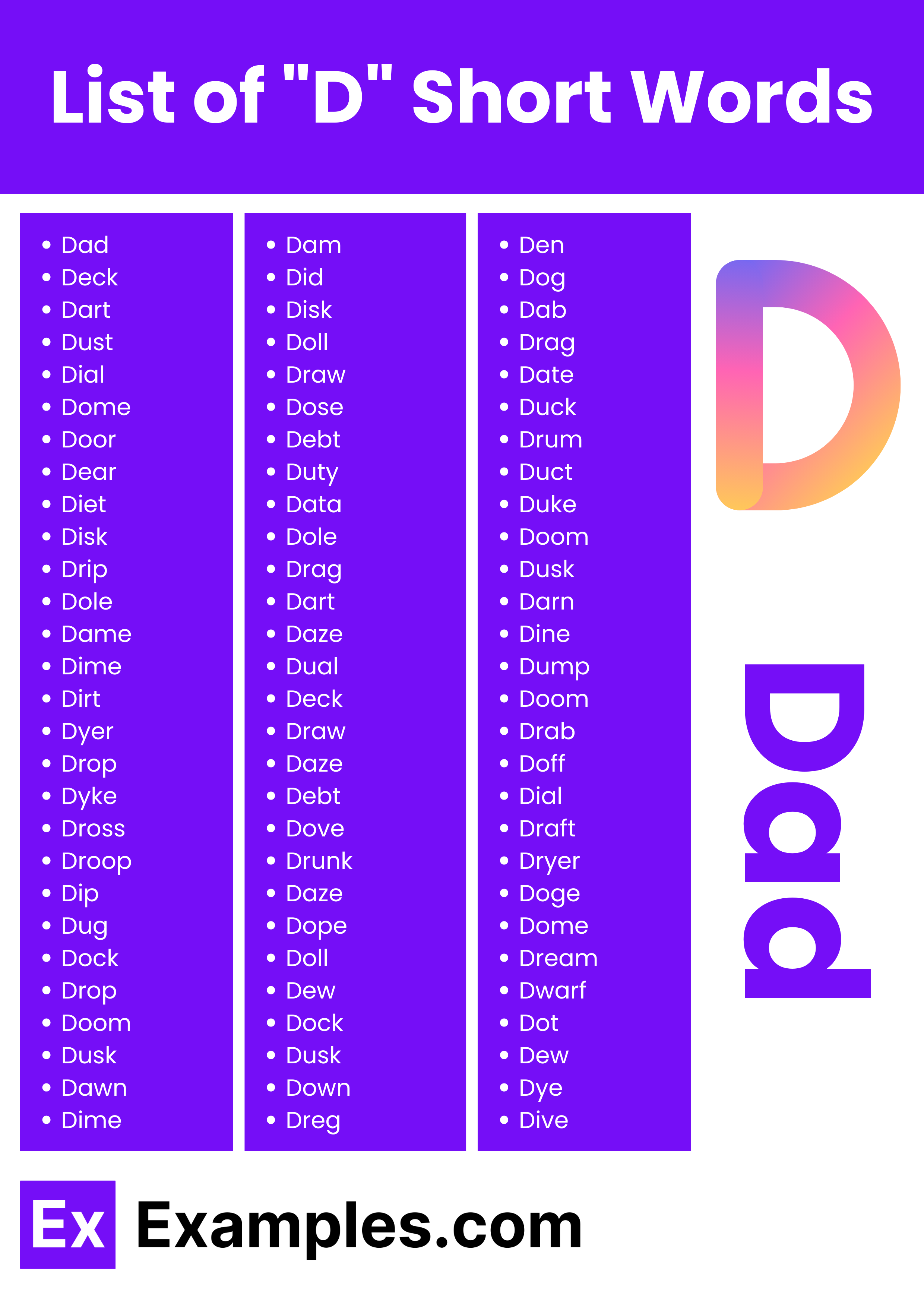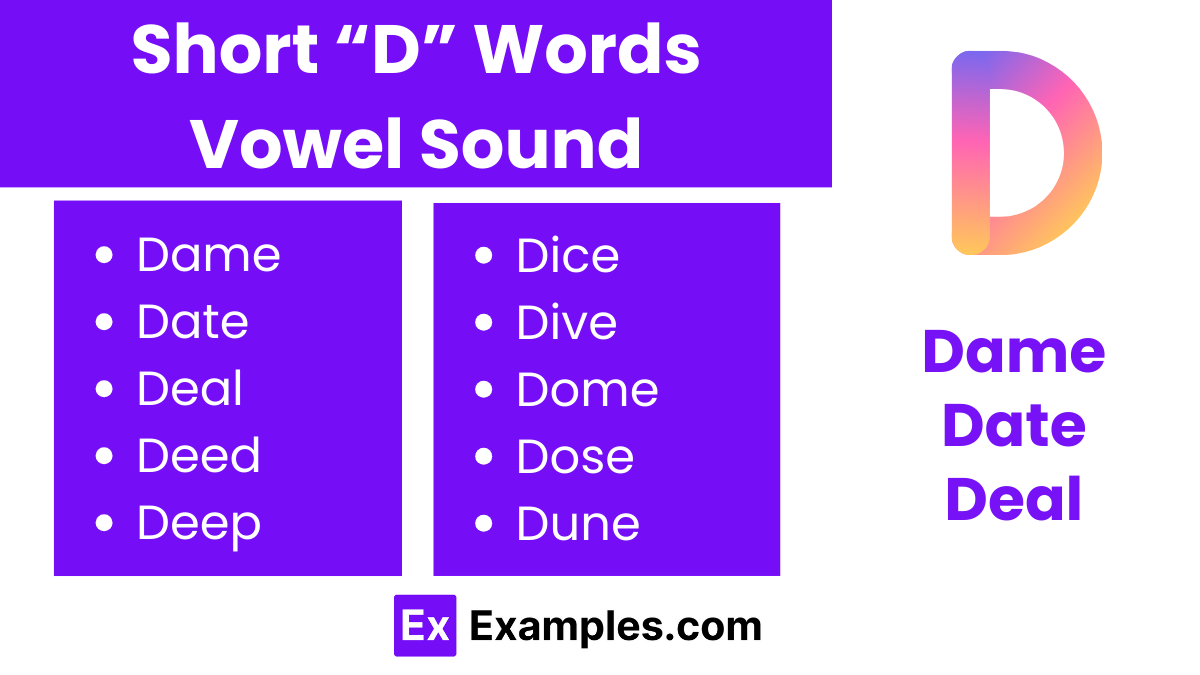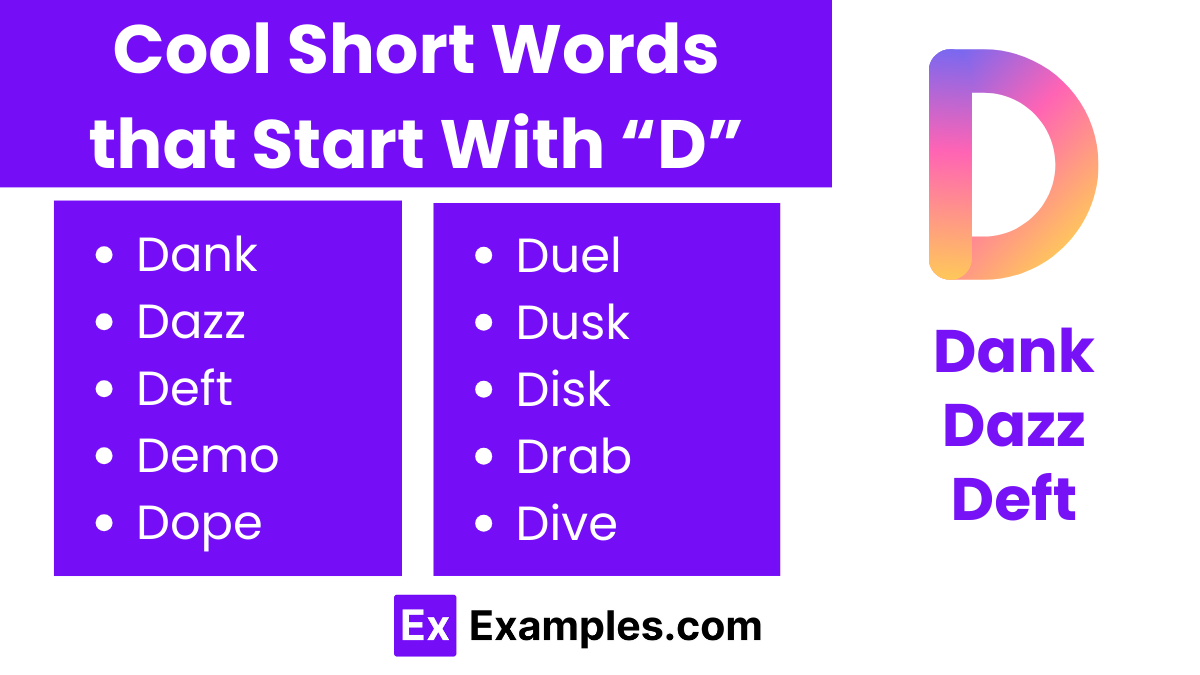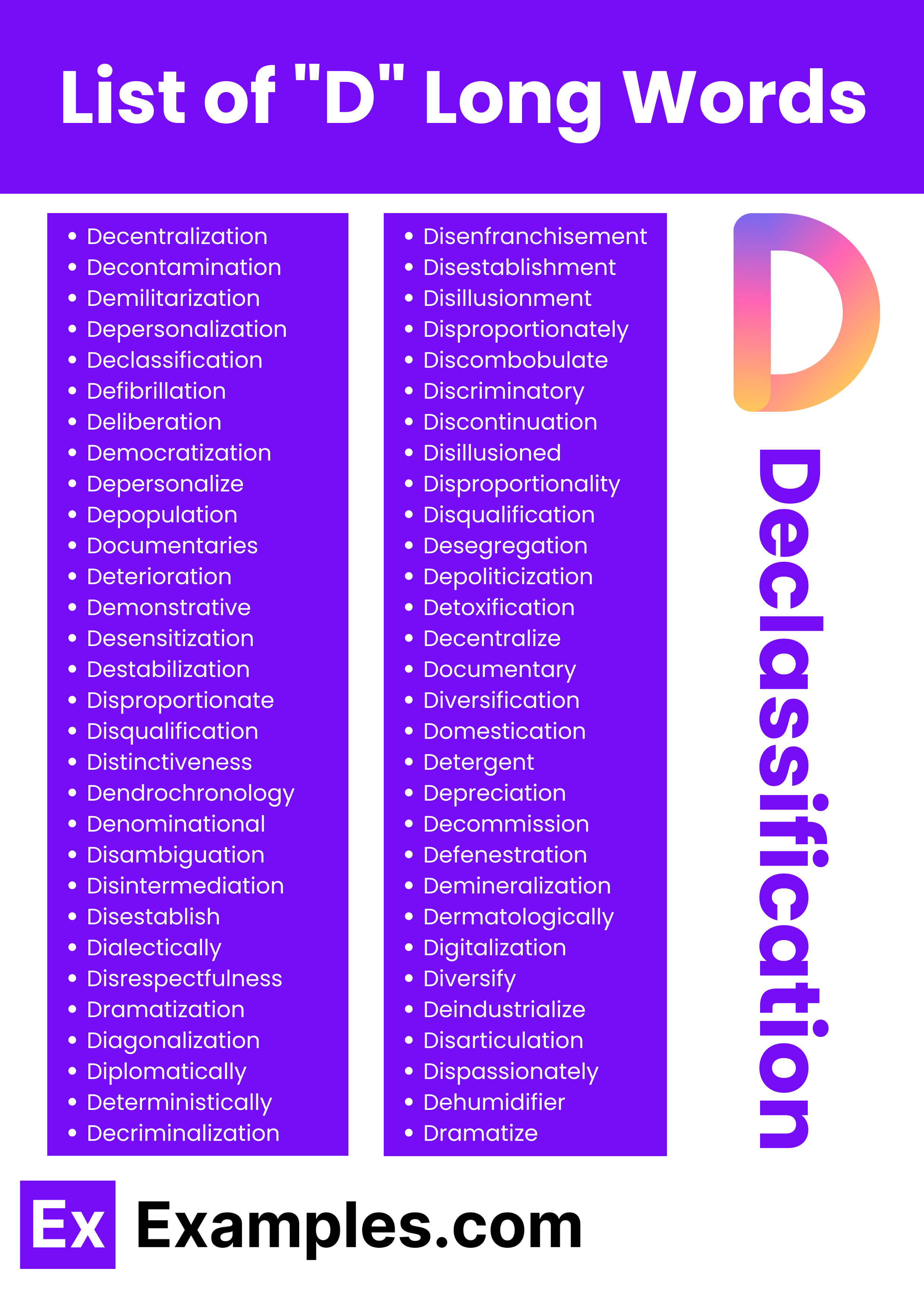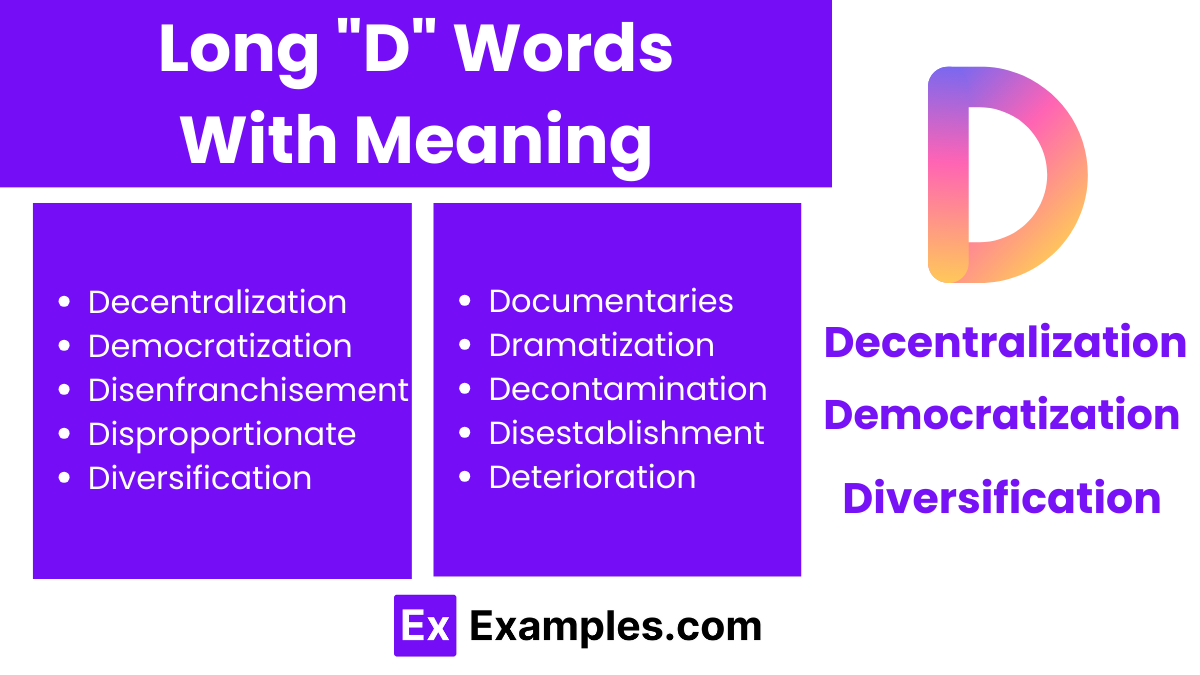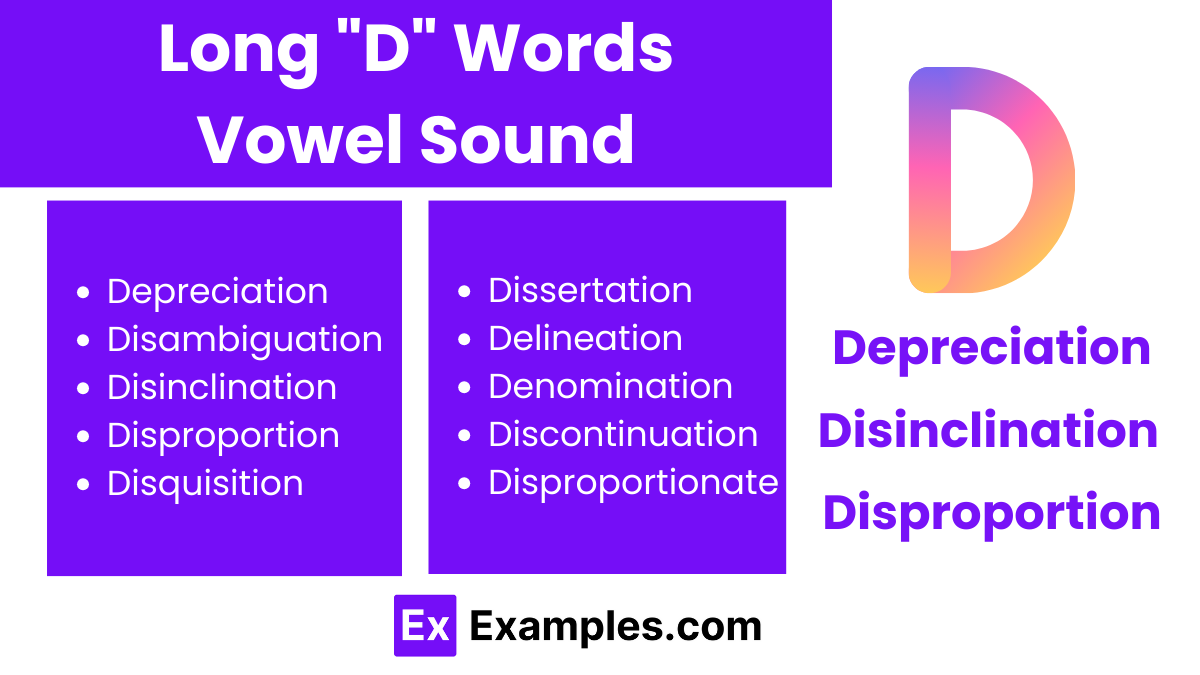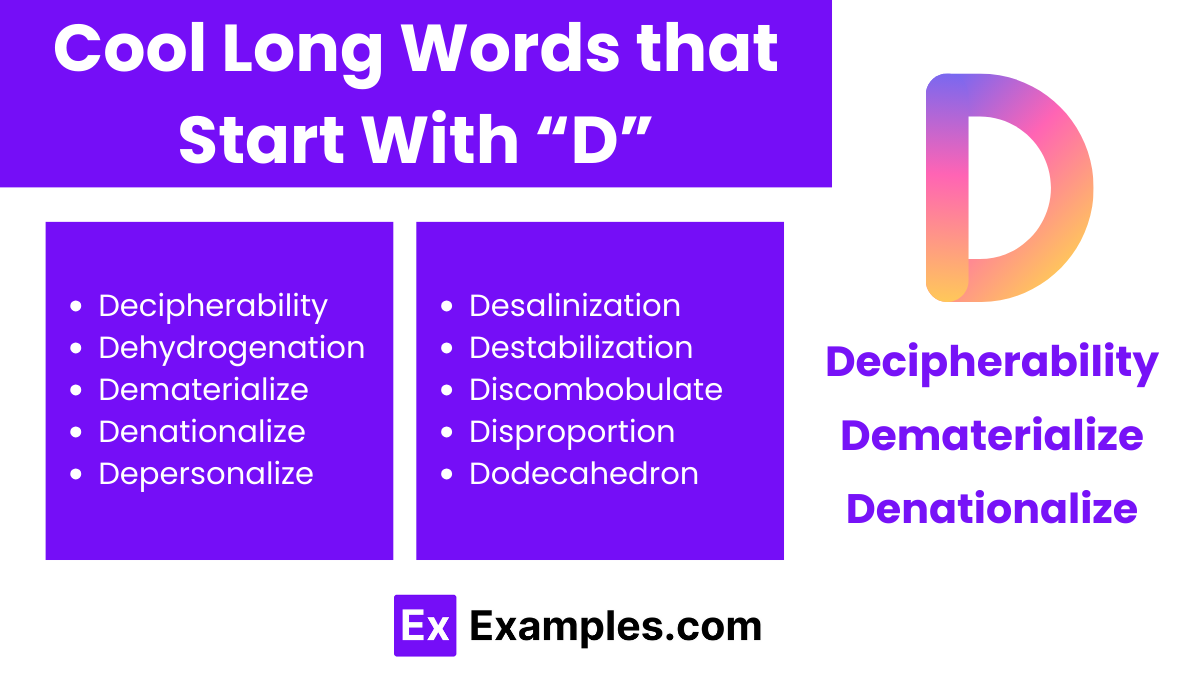Diving into the realm of “D” short and long words unveils a tapestry of linguistic richness that spans the spectrum of communication. Short “D” words deliver punchy, direct expressions vital for everyday language, while long “D” words weave complexity and precision into our verbal and written narratives. This exploration not only enriches vocabulary but also sharpens our ability to articulate detailed concepts and succinct thoughts, enhancing clarity and depth in every conversation and text.
What are Short “D” Words?
Short “D” words are concise terms in the English language that start with the letter “D”. These words, typically comprising one syllable or just a few letters, are fundamental for clear and efficient communication. They include a wide array of parts of speech, such as verbs, nouns, adjectives, and adverbs, making them versatile tools for both spoken and written English. Short “D” words are particularly effective for emphasizing action, creating vivid descriptions, or providing direction, and they’re easily integrated into daily language use, enhancing vocabulary with minimal effort.
Way to Spell Short “D” Words
The way to spell short “D” words generally follows basic English phonetic rules, making them accessible for learners at all levels. Understanding the sound-letter correspondences in English, such as the “d” sound being produced by the letter “D”, is crucial. Additionally, memorizing common patterns and exceptions found in short “D” words can significantly aid in spelling them correctly. Regular practice through reading, writing, and engaging in spelling exercises can reinforce this knowledge, making the spelling of short “D” words second nature.
Download List Of D Short Words - PDF
List Of “D” Short Words
| Dad | Dam | Den | Dip | Dot | Dub |
| Deck | Did | Dog | Dug | Dew | Dim |
| Dart | Disk | Dab | Dock | Dye | Dry |
| Dust | Doll | Drag | Drop | Dive | Deal |
| Dial | Draw | Date | Doom | Dull | Damp |
| Dome | Dose | Duck | Dusk | Dual | Dine |
| Door | Debt | Drum | Dawn | Dash | Daze |
| Dear | Duty | Duct | Dime | Dare | Darn |
| Diet | Data | Duke | Daze | Deck | Dice |
| Disk | Dole | Doom | Dope | Down | Drip |
| Drip | Drag | Dusk | Doll | Duck | Dive |
| Dole | Dart | Darn | Dew | Dab | Disk |
| Dame | Daze | Dine | Dock | Dull | Duly |
| Dime | Dual | Dump | Dusk | Damp | Dose |
| Dirt | Deck | Doom | Down | Duct | Dust |
| Dyer | Draw | Drab | Dreg | Drum | Dung |
| Drop | Daze | Doff | Doge | Dote | Duke |
| Dyke | Debt | Dial | Dome | Drip | Droll |
| Dross | Dove | Draft | Dream | Dress | Drift |
| Droop | Drunk | Dryer | Dwarf | Dwell | Dyed |
Short “D” Words With Meaning 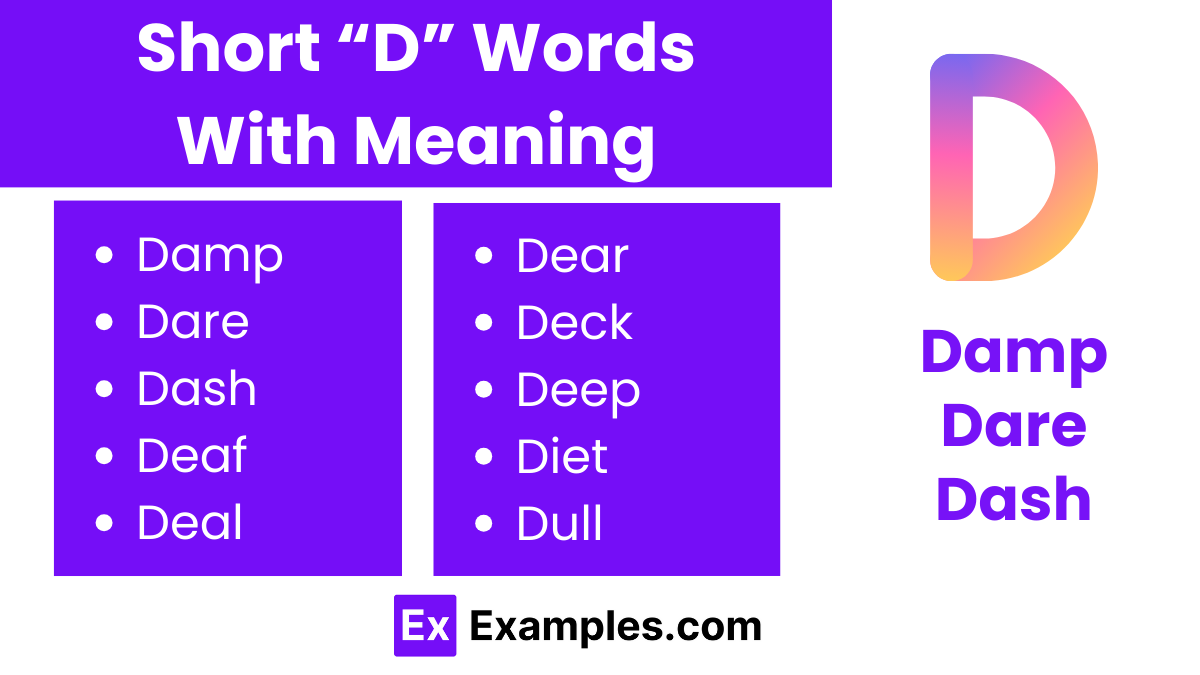
Delving into short “D” words enriches our vocabulary with versatile and powerful terms, essential for effective communication. These concise words, ranging from actions to descriptions, are pivotal in crafting clear, direct messages. Whether you’re engaging in casual conversation, writing, or seeking to enhance your linguistic skills, understanding short “D” words and their meanings is invaluable. These words not only streamline communication but also strengthen comprehension, making them indispensable for learners and proficient speakers alike. Below is a selection of ten short “D” words, each accompanied by its meaning:
- Damp – Slightly wet or moist.
- Dare – To have the courage to do something.
- Dash – To run or move quickly.
- Deaf – Lacking the power of hearing or having impaired hearing.
- Deal – To distribute cards in a game; to trade or do business.
- Dear – Regarded with deep affection; expensive.
- Deck – A floor of a ship or a pack of cards.
- Deep – Extending far down from the top or surface.
- Diet – The kinds of food that a person, animal, or community habitually eats.
- Dull – Lacking interest or excitement; not sharp.
Short “D” Words Vowel Sound
Short “D” words with a focus on vowel sounds offer a fascinating glimpse into phonetics, aiding in pronunciation and spelling. These words not only contribute to a rich vocabulary but also help in mastering the nuances of English pronunciation, making them crucial for effective communication. Below are ten short “D” words, highlighting the vowel sound, which is a core aspect of their phonetic identity:
- Dame – [deɪm] A title given to a woman equivalent to the rank of knight.
- Date – [deɪt] A social or romantic appointment or engagement.
- Deal – [diːl] To distribute among a number of recipients.
- Deed – [diːd] An action that is performed intentionally or consciously.
- Deep – [diːp] Extending far down from the top or surface.
- Dice – [daɪs] A small cube with each side having a different number of spots on it, used in games.
- Dive – [daɪv] To jump head first into water.
- Dome – [doʊm] A rounded vault forming the roof of a building or structure.
- Dose – [doʊs] A quantity of a medicine or drug taken or recommended to be taken at a particular time.
- Dune – [duːn] A mound or ridge of sand formed by the wind, usually along the beach or in a desert.
Cool Short Words that Start With “D”
Cool short “D” words pack a punch with their crisp sounds and meanings, making them trendy additions to conversations and writings. These words are not just linguistically interesting but also carry a vibe that resonates with modern communication, perfect for social media, creative projects, and daily dialogue.
- Dank – Unpleasantly damp and cold.
- Dazz – To impress deeply; astonish with delight.
- Deft – Neatly skillful and quick in one’s movements.
- Demo – A demonstration of a product or technique.
- Dope – Excellent or very good.
- Duel – A contest with deadly weapons between two people.
- Dusk – The darker stage of twilight, especially in the evening.
- Disk – A flat, thin, round object.
- Drab – Lacking brightness or interest; drearily dull.
- Dive – To plunge into water intentionally; a disreputable or seedy bar.
What are Long “D” Words?
Long “D” words are multisyllabic terms in the English language that start with the letter “D,” often characterized by their complexity and specificity. These words can articulate nuanced concepts, detailed descriptions, and sophisticated ideas, making them invaluable for academic writing, professional discourse, and advanced communication. They enrich conversations and texts with depth and precision, allowing for clear and effective expression of complex thoughts.
Way to Spell Long “D” Words
The way to spell long “D” words involves understanding their etymology, including Greek and Latin roots, prefixes, and suffixes, which are common in the English language. Recognizing patterns in word formation, such as the use of “-tion” for nouns indicating a process or state, or “-ous” for adjectives, can aid in spelling these longer terms accurately. Additionally, breaking down long “D” words into smaller, manageable parts can help in both spelling and pronunciation, making it easier to master their use. Regular practice, along with consulting reliable dictionaries and language resources, is key to becoming proficient in spelling and using long “D” words effectively.
Download List of D Long Words - PDF
List of “D” Long Words
| Decentralization | Disenfranchisement | Disproportionate | Diversification |
| Decontamination | Disestablishment | Disqualification | Domestication |
| Demilitarization | Disillusionment | Distinctiveness | Detergent |
| Depersonalization | Disproportionately | Dendrochronology | Depreciation |
| Declassification | Discombobulate | Denominational | Decommission |
| Defibrillation | Discriminatory | Disambiguation | Defenestration |
| Deliberation | Discontinuation | Disintermediation | Demineralization |
| Democratization | Disillusioned | Disestablish | Dermatologically |
| Depersonalize | Disproportionality | Dialectically | Digitalization |
| Depopulation | Disqualification | Disrespectfulness | Diversify |
| Documentaries | Desegregation | Dramatization | Deindustrialize |
| Deterioration | Depoliticization | Diagonalization | Disarticulation |
| Demonstrative | Detoxification | Diplomatically | Dispassionately |
| Desensitization | Decentralize | Deterministically | Dehumidifier |
| Destabilization | Documentary | Decriminalization | Dramatize |
Long “D” Words With Meaning
Delving into long “D” words unveils a realm of complex and nuanced vocabulary that enriches English communication. These terms, often multisyllabic, are key to articulating detailed concepts and ideas with precision and depth. Whether for academic essays, professional reports, or intellectual discussions, long “D” words elevate language, allowing speakers and writers to convey their thoughts with clarity and sophistication. Mastering such vocabulary broadens your linguistic capabilities, enhancing your ability to engage with diverse topics thoughtfully and effectively. Here are ten long “D” words, each bolded for emphasis, accompanied by their meanings:
- Decentralization – The process of distributing or dispersing functions, powers, people, or things away from a central location or authority.
- Democratization – The action of making something accessible to everyone or more democratic.
- Disenfranchisement – The state of being deprived of a right or privilege, especially the right to vote.
- Disproportionate – Too large or too small in comparison with something else.
- Diversification – The action of making or becoming more diverse or varied.
- Documentaries – Nonfictional movies or television programs that provide a factual record or report.
- Dramatization – The process of adapting a story or an event into a play or movie.
- Decontamination – The process of removing or neutralizing contaminants that have accumulated on personnel and equipment.
- Disestablishment – The action of withdrawing state support or recognition from an established church.
- Deterioration – The process of becoming progressively worse.
Long “D” Words Vowel Sound
Focusing on the phonetics, long “D” words with specific vowel sounds offer a fascinating insight into English pronunciation, aiding in both speech and listening skills. Here are ten long “D” words, highlighted for their unique vowel sounds:
- Depreciation – [ˌdiːprɪʃiˈeɪʃn] A reduction in the value of an asset over time, especially due to wear and tear.
- Disambiguation – [dɪsˌæmbɪɡjuˈeɪʃn] The removal of ambiguity by making something clear.
- Disinclination – [ˌdɪsɪnklɪˈneɪʃn] A reluctance or lack of enthusiasm.
- Disproportion – [ˌdɪsprəˈpɔːʃn] A lack of proportion; imbalance.
- Disquisition – [ˌdɪskwɪˈzɪʃn] A long or elaborate essay or discussion on a particular subject.
- Dissertation – [ˌdɪsəˈteɪʃn] A long essay on a particular subject, especially one written for a university degree or diploma.
- Delineation – [dɪˌlɪniˈeɪʃn] The action of describing or portraying something precisely.
- Denomination – [dɪˌnɒmɪˈneɪʃn] A recognized autonomous branch of the Christian Church.
- Discontinuation – [dɪsˌkɒntɪnjuˈeɪʃn] The action or process of ending or stopping something.
- Disproportionate – [dɪsˌprɔːpərˈʃəneɪt] Out of proportion; too much or too little in relation to something else.
Cool Long Words that Start With “D”
Long “D” words aren’t just about complexity; they also have a cool factor, intriguing those who love the richness of the English language. Here are ten cool long “D” words:
- Decipherability – The quality of being able to be decoded or understood.
- Dehydrogenation – The chemical process of removing hydrogen from a substance.
- Dematerialize – To become free of physical substance or to cause something to do so.
- Denationalize – To remove national ownership or control.
- Depersonalize – To make impersonal or remove personal characteristics.
- Desalinization – The process of removing salt from seawater.
- Destabilization – The action of making something unstable.
- Discombobulate – To confuse or disconcert; upset; frustrate.
- Disproportion – The condition of being out of proportion.
- Dodecahedron – A three-dimensional shape having twelve flat faces.
Exploring short and long “D” words offers a fascinating journey through the English language, revealing the versatility and depth of vocabulary starting with “D”. From concise, impactful short words that drive communication to complex, nuanced long words that enrich discussions, mastering these terms enhances linguistic skills, elevates expression, and broadens understanding, making every conversation and piece of writing more engaging and informative.




